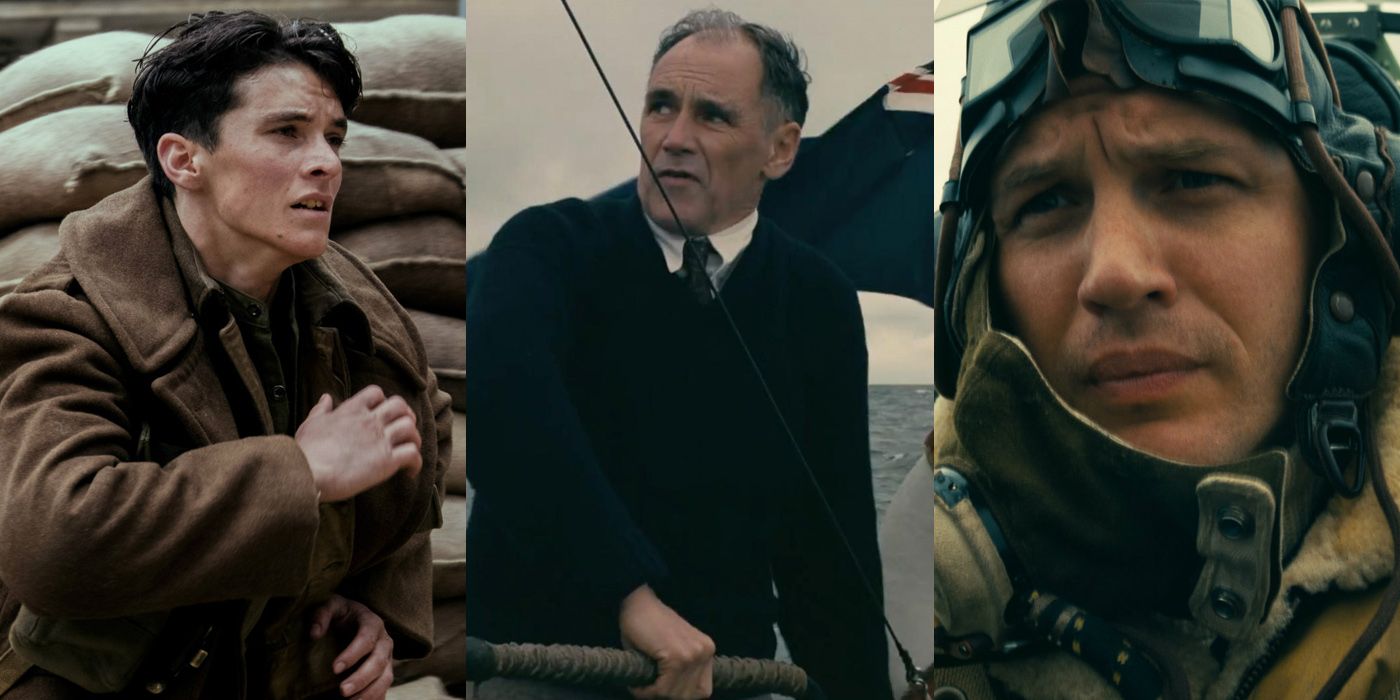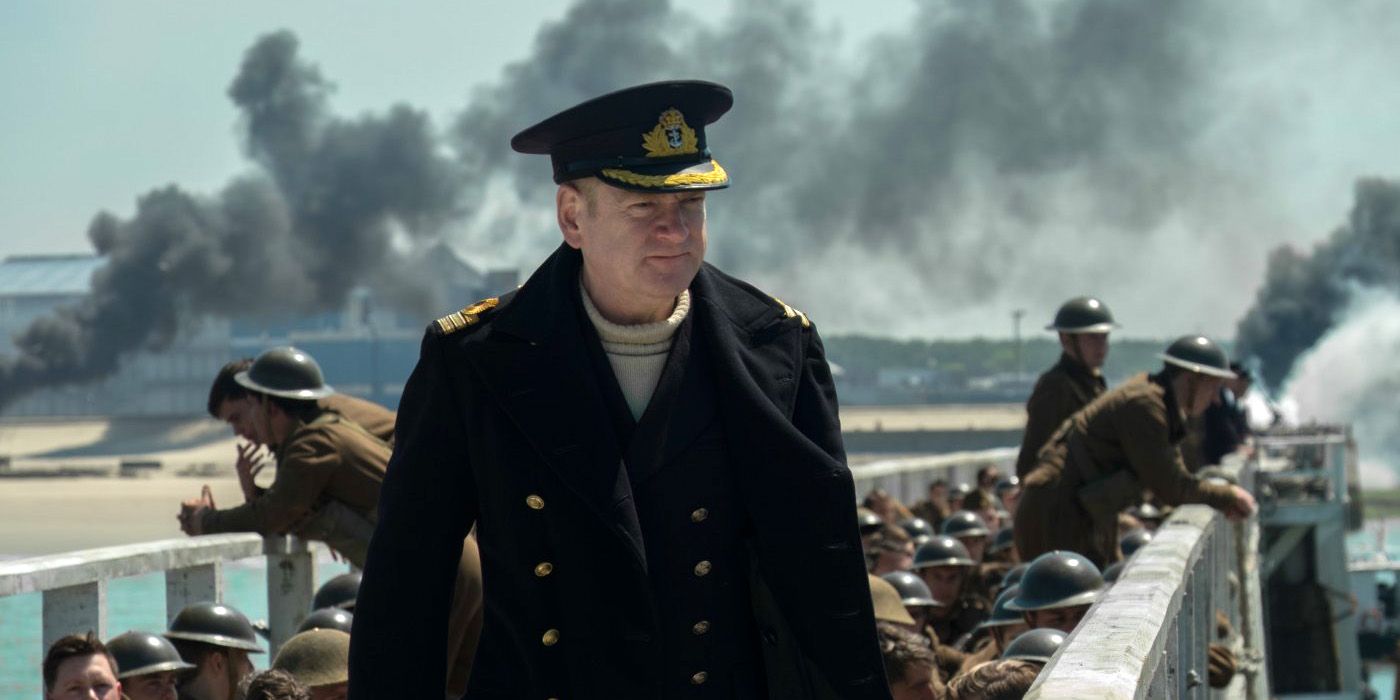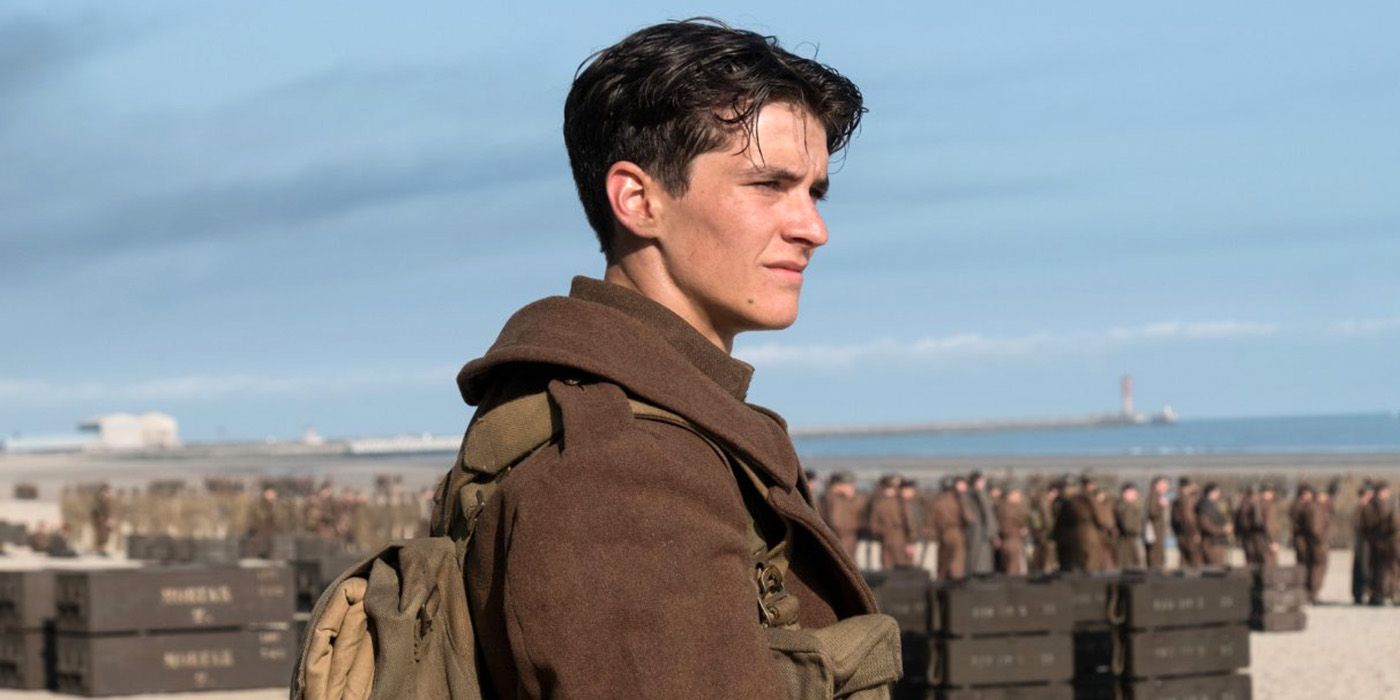Christopher Nolan's latest film, Dunkirk, has generated scores of positive reviews and early Oscar buzz. The movie itself is a departure for the filmmaker. Nolan films are usually epic in size and scale, with sprawling plotlines and enough layers to keep people talking and guessing long after the final credits roll. But even with the scope of Dunkirk, which is suitably epic considering the event, Nolan went for quiet emotion over bombastic declarations, letting Zimmer's score and the sound design do most of the talking. Dunkirk relies on a quieter kind of heroism.
Dunkirk is notably lacking a clear protagonist; the film leans hard on the ensemble instead, focusing on multiple stories without making one the centerpiece of the entire film. There are a group of soldiers trying to survive on the beach, there is a small boat heading towards Dunkirk to rescue survivors, and there are a pair of pilots soaring overhead to protect them. Fionn Whitehead, who plays Tommy, is billed first, and he is the one who gets perhaps the most rousing speech of them all towards the end of the film. But Tommy is hardly the protagonist, if only because we cannot call a character we know nothing about the protagonist.
Indeed, we know very little about any of the characters. Tommy is just a boy trying to survive a horrible situation; he spends little time thinking about family back home. There are no scenes in which a photo of a wife or girlfriend is glimpsed. No scenes where the men reflect on the lives they held before the war, or on the futures they are hoping to achieve. Everything is firmly focused on the present, and what is happening there.
Noticeably, there are also no scenes set back in London, where higher ranking officials discuss what to do and how to bring the men home. The closest we get to that is Kenneth Branagh's Commander Bolton, who is physically present on the beach with his men. Many war movies will often leave the action to return to war rooms, where those out of the action will make stirring declarations or incur hatred by abandoning soldiers to their fate. We never even see the scene in which Mr. Dawson (Mark Rylance), Peter (Tom Glynn-Carney), and George (Barry Keoghan) are called to action; we simply see them heading out to sea having been enlisted as part of the rescue effort.
Nolan spends a large part of the film eschewing major war film tropes, and as a result the film is fairly quiet emotionally. Only two named characters who we spend time with die, and one of these deaths is an accident rather than a heroic sacrifice. While many jokes have been made about how all the major characters look alike, Nolan at least crafts a film where there are few archetypes to be filled; those that do exist, such as Bolton and Tom Hardy's heroic pilot Farrier, go about their roles without much fuss or ado.
There are very few moments of "rah-rah" inspiration in this film, which comes to my final point about Dunkirk - Nolan is not interested in scenes of outright heroics. There is no single "once more into the breach" type scene in which the protagonists are all rallied together by a stirring speech and charge into action. Cillian Murphy's character, simply referred to as "shivering soldier," never has a moment in which he magically overcomes his PTSD and then sacrifices himself heroically to atone for perceived cowardice. The characters do their duty and try to survive.
There are two scenes that dance close to pure schmaltz. One is when the injured George tells Peter how he longed to prove to his teachers that he could make something out of himself. The other is at the end, when Tommy reads aloud Winston Churchill's words from a newspaper. Both scenes stray close to traditional war films - the tragedy of a young life wasted, and the big rousing speech - but neither ever cross the line into overly sentimental nonsense, unlike other films which thrive in a sense of self importance.
Dunkirk does not have time for rousing speeches. Instead, it focuses on a quiet sort of heroism. The tagline for the film reads "survival is victory," and this film embodies that as a thesis. The men on the beach do not need to engage in acts of desperate heroism for us to care about them. Instead, we want them to survive because in their situation, survival truly will be a victory. Similarly, Farrier and the other pilot Collins (Jack Lowden) do not need to do daring aerial stunts to be seen as heroes. They are doing their duty, even though Farrier is aware that his duty will most likely end with his plane crashing or his capture.
Those coming to their aid also do not need to engage in noble acts of courage, because what they were is heroic in and of itself. Mr. Dawson is perhaps the clearest cut hero in the film, because he is willingly going into a war zone to rescue trapped soldiers. But he doesn't make a fuss about it. There are no scenes in which an angelic light shines on him and the others marvel at how brave he is. Nolan presents his actions as being heroic without driving the point home so hard that it becomes annoying or overbearing.
Nolan's film is unexpected and surprisingly scarce on several popular war movie tropes, and is stronger for it. The film's simple, quiet take on war and the actions of men (and yes, it is men here - the lack of dead wives and pining girlfriends is a strength given Nolan's track record) is less of a sprawling epic and more of an intimate character study set against an epic backdrop. The film does want to stir hope and feeling in it's audience, but it doesn't do so by overblowing the characters and driving home points over and over. Instead, Nolan crafts something fresh, a step in the right direction for a filmmaker who too often gets bogged down with driving home sentimental concepts. Here, his talent as a filmmaker who longs to tell emotional stories against an epic backdrop is finally realized in it's fullest capacity.



